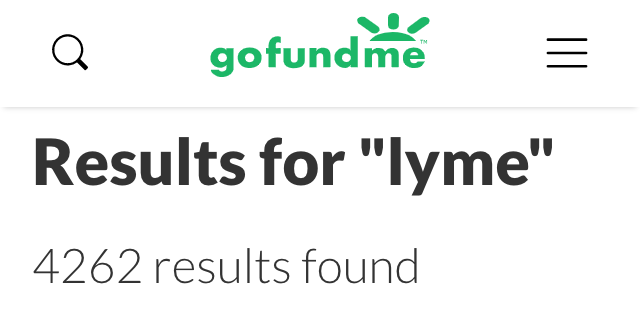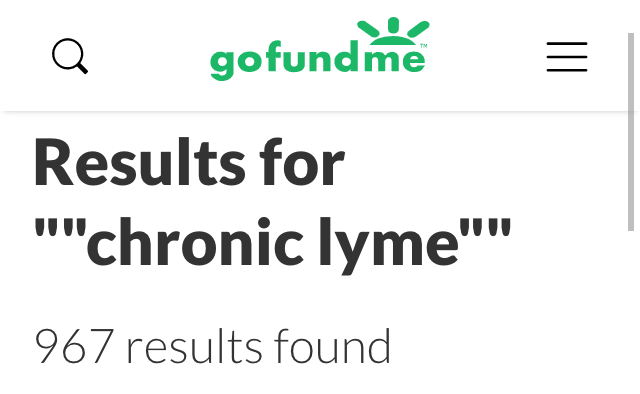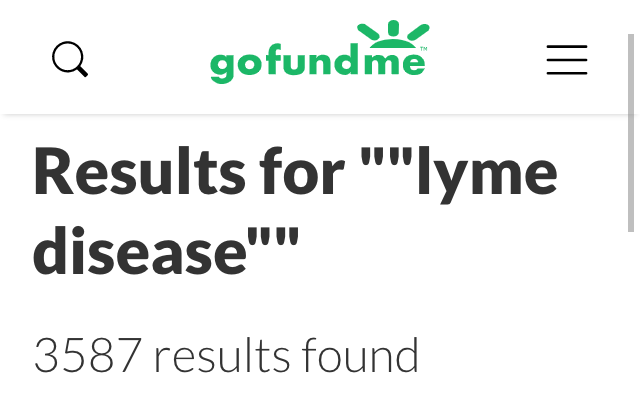Real cases of Lyme disease are curable with cheap, generic antibiotics, the costs of which are usually covered by health systems. Therefore, any fundraiser for Lyme disease treatments is likely to be for fraudulent “Chronic Lyme” treatments.
Crowdfunding sites such as GoFundMe have hosted thousands of questionable fundraisers for so-called Lyme disease. Ethicists writing in JAMA were particularly concerned about fundraisers they found for risky and disproven long term antibiotics.



Because “Chronic Lyme” is a pseudoscientific belief system, all manner of quack treatments have been peddled as possible treatment. In a 2015 scientific review, scientists listed 30 “unorthodox” Lyme therapies without evidence for efficacy.
Some of the more bizarre cure-alls sold to treat “chronic Lyme” include ozone, bee venom therapy, long term antibiotics, herbs, homeopathy, rife machines, coffee enemas, various “detox” products, stem cells, malaria injections, hydrogen peroxide, and intravenous garlic.
The FDA defines as health fraud as:
The deceptive promotion, advertising, distribution, or sale of a product represented as being effective to prevent, diagnose, treat, cure or lessen an illness or condition, or provide another beneficial effect on health, but that has not been scientifically proven safe and effective for such purposes.
The FDA definition of health fraud does not require any specific intent to defraud. Many practitioners who advertise as “Lyme literate” are well-meaning but incompetent. Nevertheless, chronic Lyme quackery can be very financially lucrative.
Victims of health fraud who receive a fake “chronic Lyme” diagnosis are told that their health depends on seeing a “Lyme literate” doctor and avoiding mainstream doctors. Social media and deceptive pseudoscience organizations (many with “Lyme” in their names) gladly refer patients to “Lyme literate” doctors.
The victims are usually diagnosed with multiple fake coinfections, which makes them even more likely to believe that a mainstream doctor cannot handle their complex situation. Therefore, “Lyme literate” practitioners have a captive market and can charge inordinate amounts of money.
Many turn to crowdfunding to afford the expensive hope sold by “Lyme literate” practitioners. Quackery is therefore fed by friends, families, and even whole communities who think that they are paying for life-saving treatments.
When the patient is a minor, crowdfunding can facilitate Medical Child Abuse, sometimes called Munchausen by Proxy.
The LymeScience list of Red Flags of Chronic Lyme Quackery may be useful for determining if a fundraiser is for fraudulent treatments.
Video: How Lil Nas X Got Fooled by the “Chronic Lyme Disease” Scam
After a desperate plea by victims of chronic Lyme quackery, rapper Lil Nas X offered money to pay for dubious treatments. Rebecca Watson, a long time advocate for science and skepticism, discussed what happened in the video below. A transcript and links are available on the Skepchick web site.
References
Below are articles about fundraisers for quackery, many that specifically discuss Lyme disease.
Dr. David Robert Grimes: Fundraising appeals for the desperately ill are moving, but evidence is crucial
Dr. Daniel Summers: Predator Doctors Take Advantage of Patients With ‘Chronic Lyme’ Scam
Rebecca Watson: Lil Nas X Got Fooled by the “Chronic Lyme Disease” Scam
The Courier-Mail: Australians who claim to suffer Lyme disease send a spike in crowdfunding
Murdoch, et al. Media portrayal of illness-related medical crowdfunding: A content analysis of newspaper articles in the United States and Canada. Plos One. 2019.
Snyder J, et al. Appealing to the crowd: ethical justifications in Canadian medical crowdfunding campaigns. J Med Ethics. 2017;43(6):364-367.
Vox F, et al. Medical Crowdfunding for Scientifically Unsupported or Potentially Dangerous Treatments. JAMA. 2018;320(16):1705-1706.
Snyder J, Cohen IG. Medical Crowdfunding for Unproven Medical Treatments: Should Gofundme Become a Gatekeeper? Hastings Cent Rep. 2019;49(6):32-38.
The Verge: Bioethics experts call on GoFundMe to ban unproven medical treatments
Dr. Steven Novella: Crowd Funding Quackery
Ford Vox, Kelly McBride Folkers, Arthur Caplan: Medical Crowdfunding’s Dark Side
MinnPost: Crowdfunding sites raise millions for dubious treatments, study finds
The Guardian Editorial Board: A-list fundraising: hogging the Lyme light
Dr. David Gorski: How do we stop crowdfunding sites like GoFundMe from being used to fund quackery?
Dr. David Gorski: The Compassion Gambit
Dr. David Gorski: Crowdfunding: The fuel for cancer quackery
NECN: Desperate & Duped? GoFundMe Means Big Bucks for Dubious Care, Study Finds
Dr. Steven Novella: ‘What Used to Be Fraud Is Now Alternative Medicine’ (video)
Elite Learning: 7 Red Flags for Fraud in Medical Records
Kwakzalverij.nl: Lymepatiënten houden kwakzalvers in leven met fundraising (Lyme patients keep quacks alive with fundraising)
Coutrot IP, et al. Is the rise of crowdfunding for medical expenses in the UK symptomatic of systemic gaps in health and social care? J Health Serv Res Policy. 2020;
Vassell A, et al. What was lost, missing, sought and hoped for: Qualitatively exploring medical crowdfunding campaign narratives for Lyme disease. Health (London). 2020.
Vassell A. Medical crowdfunding and the communication of health-related financial needs in digital environments. 2019.
Dr. Saul Green: The Realities of Alternative Medicine for Serious Illness
Jonathan Jarry: I Donated to a Crowdfunding Appeal, But Did I Just Finance a Cancer Quack?
Mela Eckenfels: Pseudomedizin: Spenden Sie nicht! [Pseudomedicine: Don’t donate!]
Rynekzdrowia.pl: “Mamy lukę w przepisach”. Zbiórek w internecie na pseudoterapie dziś nie da się zablokować [“We have a loophole in the regulations”. Online collections for pseudo-therapies cannot be blocked today]